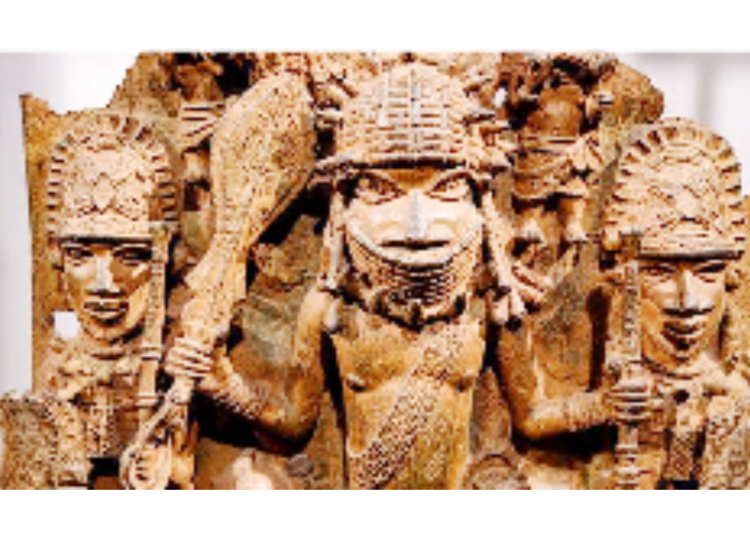In the ongoing discussion about the return of over 2000 Benin Bronze works looted by Britain in 1897, questions of ownership, preservation, and restitution have emerged. Recent repatriation efforts by Germany have brought these issues to the forefront, sparking debates about the rightful custodian of the artifacts and the need for restitution.
One key argument revolves around the agreement between the Nigerian government and Germany, which lacks explicit mention of restitution and instead includes a ten-year loan period for some of the bronze works to be displayed in German museums. Critics question why the bronze works should be handed over to the Oba of Benin if the repatriation is a government-to-government transaction. Concerns are raised about the security of the artifacts against theft and their accessibility to the public once under the custody of the Oba.
To address these concerns, the Society of Nigerian Artists (SNA), in collaboration with the German cultural agency Goethe Institut, organised a roundtable discussion titled “Abuja Conversation: Benin Bronzes and Nigeria: Self-serving Cultural Diplomacy, or a Service to Nigeria?” The event aimed to explore various perspectives on the issue.
During the discussion, John Asein, a lawyer and the director general of the National Copyright Commission (NCC), argued that the bronze works rightfully belong to the custody of the Oba of Benin based on traditional notions of ownership. He emphasized that ownership in traditional societies is not always individual but extends to the dead, the living, and the unborn. Asein highlighted that the Oba, as an institution, represents the traditional society and should be entrusted with the responsibility of preserving and securing the artifacts.
In defining ownership, Asein said, “In traditional societies, ownership is not always individual. Ownership is often three-dimensional at the least. It includes the dead, the living, and the unborn. Even the court in the early days made the pronouncement that land will never belong to the individual. It is owned by the ancestors, the living and the dead. That is the attitude of the average African to the issue of ownership. The only way to begin to approximate the holder of the instrument of ownership is to find the institution and the person that embodies that society, to be the representation of the traditional society from which an object had been taken.
“I took the time to peruse what Mr President issued in notice on the recognition of ownership, and an order vesting custody and management of repatriated, looted Benin artefacts in the Oba of Benin Kingdom. Artefact in that notice locates the origin of the objects, which are from the Benin Kingdom. It had a narrative to show that issue of ownership is a symbolic attribution to the Oba of Benin.
“Obviously, the Oba didn’t make all those objects. But who do you want to hand them over to? Remember that the Oba in this case is an institution, not a person. There are clear protocols guiding the tradition and institution of the Oba. The Oba will not work alone but interface with other agencies to ensure that it is preserved and secured,” stressed Asein.
Hence, the Oba as an institution that is representative of the people of Benin has the responsibility for the custody of the artefacts.
On the safety of the artefact within the Oba’s palace, Asein dismissed as unnecessary fears.
“Repatriation is the first step to reparation. Sometimes, the persons concerned may feel that is enough, and they don’t need to pay them anything. The question of monetary restitution is not where we (Benin people) are at the moment. What the people want is to have what belongs to them. I think people will survive even if there is no other reparation in terms of money.
“In my view, the removal of the bronze works was like breaking the soul of the kingdom. You can imagine how the kingdom would have felt when that looting happened and those around the palace suddenly found that their treasures, their history, their library, and indeed the go-between them and their gods, had just disappeared. It was like the soul of the kingdom was stolen that day. And I don’t know that the kingdom ever recovered from it,” said Asein.
Supporting Asein’s viewpoint, Prof Ken Okoli, former Head of Department, Fine Arts, at Ahmadu Bello University (ABU) Zaria, stated that the Oba’s palace is the safest place for the artifacts. He argued that their presence in the palace would honor the Benin ancestors and boost tourism and economic development in Edo State.
“The Portrait of Ali Megoro made by the late Abayaomi Baba and other artworks have been stolen from the collection of the National Museum in Lagos. Is it the same government that you want to give these 1100 bronze works? Is it not better in its place of origin? The Benin monarch is a god. That is how his subjects, the Benin people, see him. Have you ever heard that anything has been stolen from the Benin palace since that punitive expedition of 1897? No Benin man who breathes air, dares to go into the Oba’s palace to steal. So, what are we afraid of? If the Germans want to build a holding facility or a museum, why not build it inside the palace? Those things were removed from altars where sacrifices were being made continuously. Why take it to a national museum in Abuja, which is like a foreign land to Benin.
“When the holding facility is built (in the palace), the necessary sacrifices will be made, and members of the public can visit (on invitation) and savour the richness of the Benin Kingdom. When people visit that museum, let them perform ablution, and go see the bronze works. The performance of that ablution will be another tourist component.”
“I agree that the Nigerian government should ask for reparation but it should ask for it from the actual thief. I cannot see my stolen shirt worn by somebody and hold that person when they bought it from an open market. It was Britain which sent 1200 soldiers to raid the Oba’s palace saying it was a ‘punitive expedition’ not war,” averred Prof Okoli.
Regarding restitution, panelists agreed that it should be pursued. However, they suggested that restitution should come after the artifacts are returned to the people of Benin to restore their spiritual functions within the community. They also stressed that Britain, the original looter, should be held accountable for restitution.
“One of the things they didn’t tell you was that these artefacts were exhibited in Britain in 1890. At the exhibition, they thought the works were from Germany or France because the artistry rivaled that of the European countries, only to discover it was from Benin Kingdom. So, there was preparation for that 1897 invasion of the Benin palace. That attack (punitive expedition) was of such high level, they came to war here and carted these bronze works away. Britain has a history of moving arts wherever its colonies are. It is happening today,” said the SNA President, Mohammed Suleiman.
Part of the repatriation agreement between the German and the Nigerian governments, is that the latter will assist in the smooth transition of the artefacts back to Nigeria, including the funding of museum space for the artefacts, in a manner dependent entirely on Nigeria.
“We do understand that now within Nigeria it is being discussed and decided where the bronzes or part of it will go in the future; where it will be housed. This is a decision and a process that is entirely up to Nigeria. We will be following this discussion with a lot of interest, and see how it plays out. Again, it is Nigeria’s decision. It will be wonderful to see the bronzes being exhibited and accessible to the public.
“In view of the large number of Benin Bronzes, it was clearly stated, and from the Nigerian side as well, that at least some of these bronzes continue to be accessible and visible in museums, not just in Germany but other countries as well. The bronzes are in some sense ‘ambassadors of Nigeria’ and Nigeria was kind to offer that a certain proportion of these bronzes in the future, despite being Nigerian property, will be graciously loaned to German museums for a long period of ten years. Then it will have to be decided if this is extended or not,” said the Deputy Ambassador, Germany to Nigeria, Mr Martin Huth.
However, how open the agreement is to Nigeria’s inclusion or request for restitution in the future is likely to bear some legal implications.
On the future of the artefacts, some Nigerians are of the opinion that post-repatriation solutions should be locally financed to ensure complete ownership. Similarly, intentional steps, they said, must be taken to promote the teaching and dissemination of information on the Benin Bronzes to the average Nigerian.
“The level of artistry (witnessed during the Benin Kingdom), that link has been cut off. The challenge now is that Nigeria has to create academies of art, create institutions that practice art that studies the advent to the looting before we can get there again,” said Suleiman.
“The Nigeria media should play the role of a gatekeeper in the matter of the Benin Bronzes. The media can disseminate the right information regarding the bronze works; information that focuses on the significance of the artefacts to Nigeria, whether one is from Benin or not, rather that it means something to us all as Nigerians,” concluded Manager, KISS FM, Uju Nwachukwu.
The repatriation agreement between Germany and Nigeria includes the Nigerian government’s assistance in facilitating the smooth transition of the artifacts back to Nigeria. It also allows Nigeria to decide where the artifacts will be housed and how they will be exhibited. Germany expressed its interest in seeing the bronzes displayed and accessible to the public, both in Nigeria and abroad.
Some Nigerians argue that post-repatriation solutions should be locally financed to ensure complete ownership and that efforts should be made to promote the teaching and dissemination of information about the Benin Bronzes to the Nigerian population.
As the discussions continue, Nigerians call on the media to play a vital role in disseminating accurate information about the significance of the bronze works to Nigeria as a whole, emphasizing their cultural and historical importance.






